Do African Grey’s Make Good Pets – Owners Care Guide & Facts
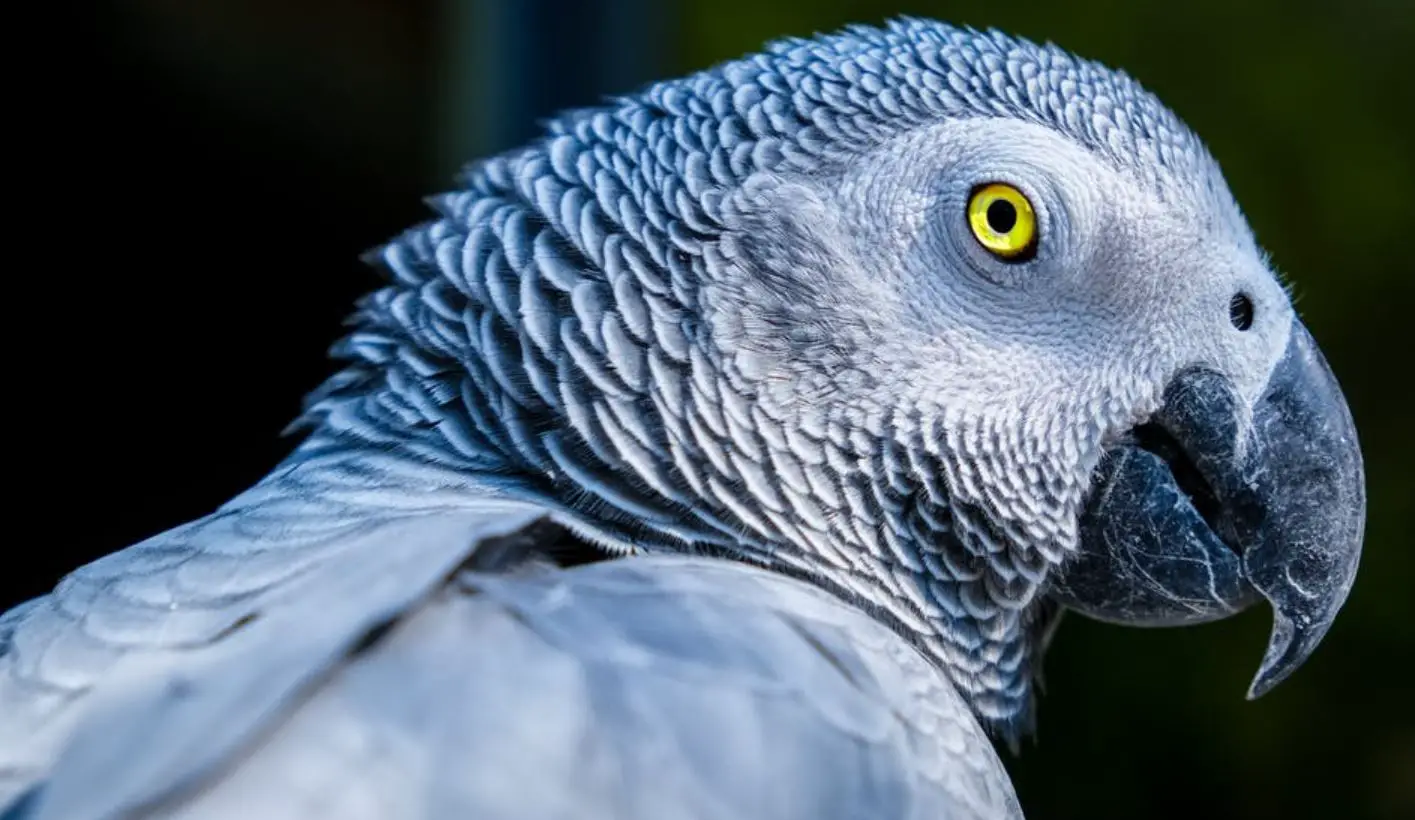
The African Grey parrot is an extremely intelligent bird and can imitate speech. If you buy an African Grey, you need to realize they make excellent pets, but your parrot will be high maintenance. These parrots like to have a routine schedule, so if you work long hours or travel a lot, this isn’t the pet for you.
Bio – Age, Lifespan, Size, Characteristics
There are two subspecies of African Gray parrots. The Congo has a larger body and is light gray. It has an all-black beak with bright red tail feathers. The Timneh has a smaller body with darker gray coloration. The beak is flesh colored on the top half, and the tail feathers are dark maroon.
The weight of these birds is about 14 ounces on average and can live from 25-30 years with proper care. Immature birds have eyes with dark grey irises that turn pale yellow when they turn one year of age. The parrots will reach sexual maturity between 4-6 years of age.
African Grey parrots are about 13 inches long with a wingspan of about 18-20 inches. The parrots are known for their speaking ability and high intelligence.
What Are They Like as Pets – Behavior
Your parrot may bond with you or another family member and rejecting anyone else. He could be intolerant of strangers or fearful. Your parrot will adapt to your home activities if you expose him early. He’ll also adjust to any other household pets. Your new pet will need exciting toys and exercises in forging, so he doesn’t become bored.
Critical Considerations Before Getting One
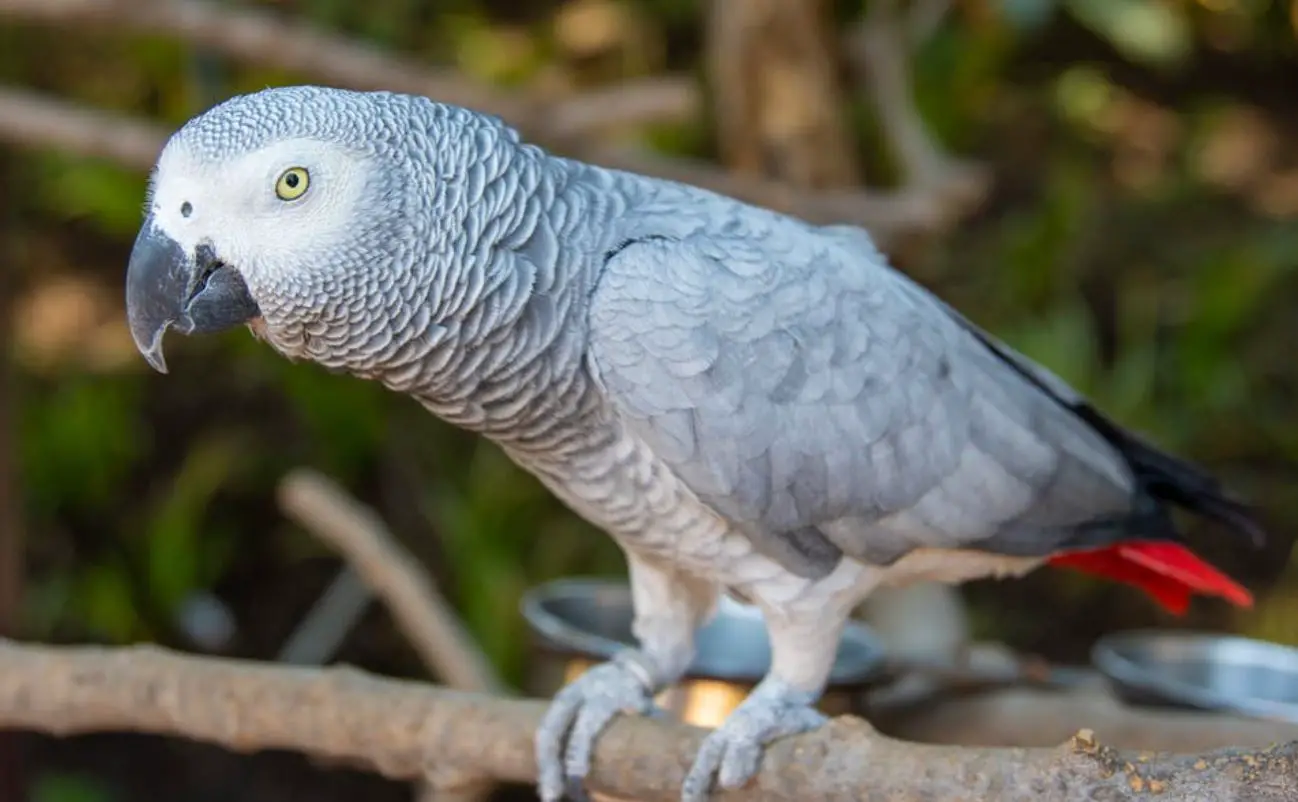
You will find that your African Grey is more than a little demanding of your attention. These parrots are highly sensitive and complex but also charming and brilliant. But this combination can lead to your parrot developing behavior issues.
These parrots love routine, and even a small change can cause chewing and plucking of their feathers. Also though your parrot will enjoy a lot of hands-on time, he won’t want to be cuddled. He might like his head scratched and some petting, but he won’t like intense physical contact.
Each parrot has its own individual preferences and tastes. Your parrot might even become a one-person bird if he’s not held by everyone in the household.
What Habitat Do They Need?
The enclosure for your parrot needs to be as large as possible. It will give your pet room to fully extend his wings. He needs to flap his wings without being able to touch the walls of the cage. The cage needs to be constructed of non-toxic, durable materials. It needs to be secure, safe, kept clean, and have perches of variable heights, widths, and textures.
To maintain your pet’s toenails, a concrete perch needs to be inserted in the cage. Don’t place any of your bird’s perches over his food or water containers, so they don’t become contaminated. Avoid placing the cage in any drafty areas.
You should place your bird’s cage in an area where he has access to natural light. You can use UV light for supplement lighting to prevent or treat hypocalcemia or feather picking. If your parrot isn’t under direct supervision, he needs to stay in a bird-safe room or his cage. If your African Grey is left to roam an unrestricted area, he could come to harm. Your bird could drown, be electrocuted, have a pet attack him, or ingest something toxic.
Can you keep them in an apartment?
Yes, you can keep your African Grey in an apartment as long as you are aware, they are noisy, and you may get a noise complaint from your neighbors. If they get restless and hyperactive, CBD can be a great supplement for your African Grey.
At what age do African Grey parrots start talking?
There isn’t any difference in the ability to speak if your parrot is a male or a female. Most Grey’s start talking between 12 to 18 months with some starting at 6 months. Your bird will start out mumbling and saying words when alone. Your bird yelling out his first word may come as a shock.
How many words?
Your parrot can learn as many as 1500 words and can also mimic sounds such as cell phone ringing and your dog barking.
Are they intelligent?
One of the most intelligent bird species is the African Grey parrot.
How to Care for Them
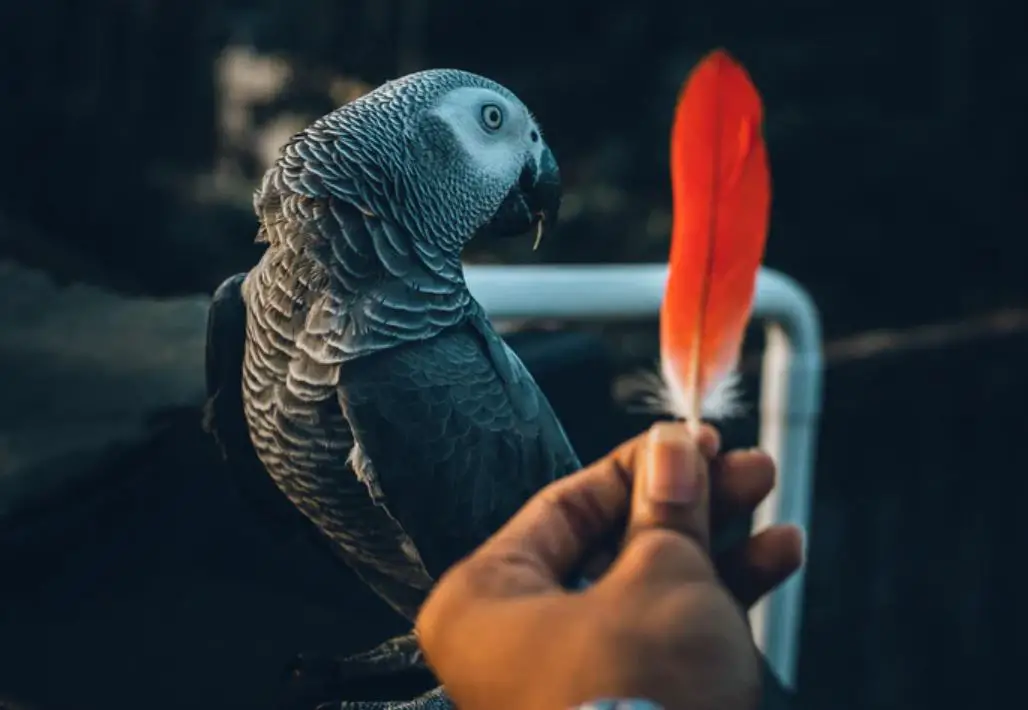
Some African Greys have been known to perform at the level of cognitive of a 4-6-year-old child. So, your parrot will need a lot of activities to keep him entertained. These birds love playing with toys and climbing up and over things.
Your bird will need a physical examination every 6-12 months and an annual examination for parasites, bacteria, and yeast. He’ll need a polyomavirus vaccine and routine blood testing. Your pet will need his nails and wings trimmed.
Behavioral problems, such as fearfulness, aggression, and feather picking, could develop. Respiratory disease, hypocalcemia syndrome, blocked nasal passages, circovirus, and proventricular dilatation disease are all illnesses to be aware of.
Placing your bird’s cage in the corner of a room against a wall will ease any stress which would be caused by the commotion in your household.
What do they eat?
You can feed your parrot formulated pellets, which is about 75% of his diet. Your pet will need vegetables, fruits, and dark leafy greens, which make up another 25%. You need to only feed treats only about 5% of his diet.
What are edible treats for African Grey?
Besides giving your pet various fruits and vegetables below is a link for Parrot treats:
https://www.northernparrots.com/parrot-treats-dept218/
Should I cover my African Grey at night?
If your bird is sleeping well not being covered at night, then you don’t need to cover him. If you feel your pet isn’t sleeping well, later you can try covering him to see if his sleeping improves.
Where’s the Best Place to Get Them and How Much Do They Cost?
You should buy an African Grey from a reputable breeder. The cost can be anywhere from $500 to $2,500. It depends on what the parrot’s age is, what it looks like, it’s abilities, and where you purchase it from.
Should I get a male or female African Grey?
It doesn’t matter if you buy a male or female, both sexes will talk.
Do parrots only bond with one person?
If your parrot has the attention of the whole family, it’s less likely to bond with just one person.
Do African Greys love their owners – Are They Affectionate
African Greys can become affectionate with their owners. But, as an African Grey owner, you need to spend time with your pet. If you want to encourage a well-rounded African Grey, then early socialization is the key. Family interaction and cognitive-communication go a long way in developing a bond with your pet.
Will my African Grey fly away?
If you trim your parrot’s wing feathers too close or too early, it can affect your pet’s sense of security and confidence. You can keep your parrot’s wind feathers long, but, if you leave a window open or another route of escape, your pet may fly away.
Are African grey parrots aggressive?
No, African Grey parrots are usually affectionate and friendly. They typically don’t bite unless they are frustrated, unhappy, or feel threatened.
Are African Greys Noisy?
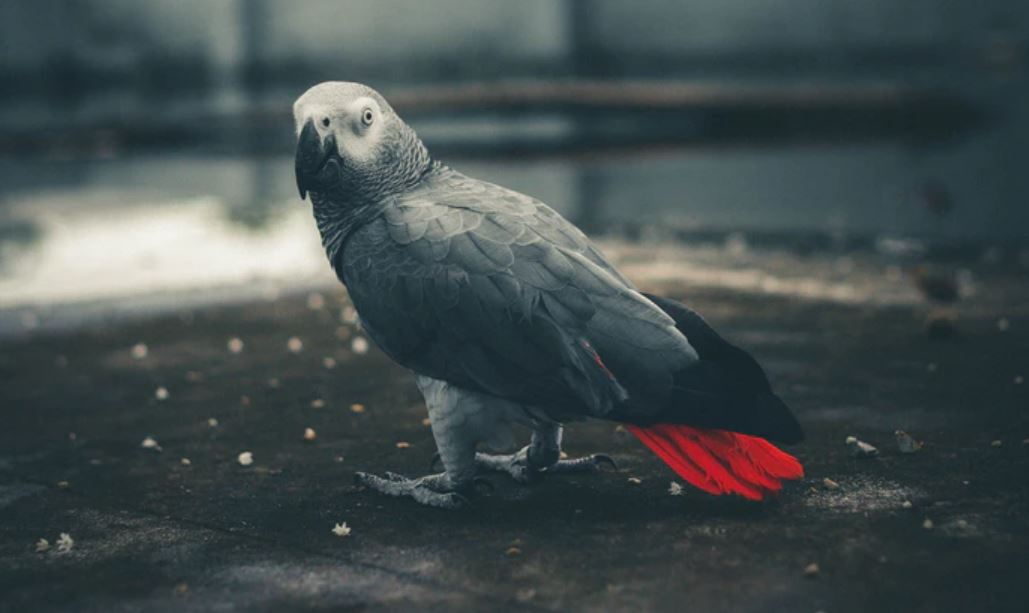
Yes, your African Grey can be extremely loud because he is very interactive. Your bird will pick up every sound and word, which makes up his environment. Over some time, your pet can become very loud and persistent when hearing these sounds daily.
Your pet could become excessively loud if he isn’t happy with his living conditions. Your bird could start screaming and shrieking when he’s frustrated, feeling threatened, or not happy. He understands that the louder he screams, the faster of a response he’ll get from you.
So, if your bird is shouting and screaming, try to figure out what he is so upset about and then meet whatever his needs are for him to quiet down.
How do I make my African Grey quieter?
A parrot makes noise, and that’s the trait that makes them a parrot. You can calm your parrot down and make him quieter, but it takes time, patience, and willingness to do so. 95% of the noise is to get you to come and interact with your pet.
Take a part of your day to work on the solution. First, you need to ignore all the loud chatter and obnoxious screaming that your parrot is making. Don’t look at him, don’t speak to him, don’t even come into the room. Your parrot will continuously get louder in hopes of luring you into the room to interact. He will stop, but it will be a battle of wills and your ears.
Then when your parrot is quiet, give him the attention that he’s craving. So, when he’s playing quietly, play with him and his toys, interact with him and talk to him. Bring him out and scratch his head or give him a treat. Eventually, your parrot will associate his behaving himself with you interacting with him, and the noise will stop.
Do African Grey parrots like to be petted?
Your parrot may want to have his head scratched or gently stroked on his breast.
How many hours of sleep does an African Grey need?
Your parrot will need about 12-14 hours of sleep per day. If you wake him up before he’s ready to wake up, your pet will be grumpy and out of sorts. If you have him covered, but the TV or people are talking late, don’t think he’s sleeping because your pet will usually be wide awake. Just because your bird is covered doesn’t mean he’s asleep.
Can African Grey parrots be left alone?
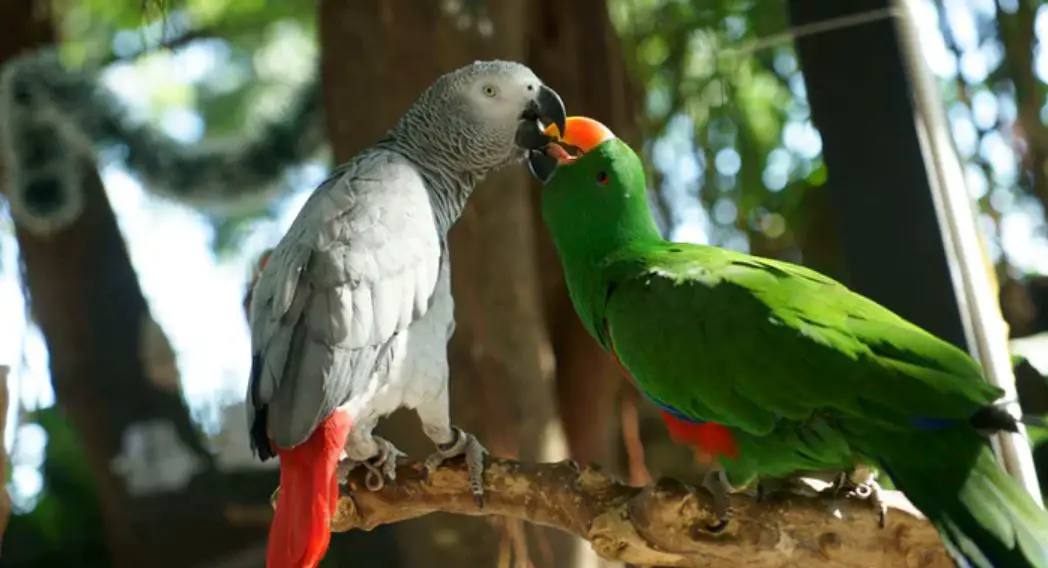
It depends on the individual bird; some African Greys can be left by themselves for up to 8 hours. But some parrots can only be left alone for a couple of hours. If you do leave your parrot along longer than he likes, then some adverse reaction to the situation may develop:
- Excessive biting: If your parrot starts to bite, he could be stressed because he’s not interacting with you as he did before.
- Screaming excessively: If your parrot starts to increase in his screaming, he could be unhappy or bored. If he only screams when you walk out of the room, then your bird might be crying for attention. If this is happening, then you’re leaving your pet alone on his own too long.
- Vocalization decreased: If you notice that your pet isn’t vocalizing or talking like before, he could be depressed or stressed. If you’re not home during the day for long periods, this could be what his issue is about.
- Plucking feathers: Plucking feathers when your parrot is bored is not a good sign. If you’re finding feathers scattered all around the floor, then your parrot doesn’t have enough stimulation to keep him happy.
- Mutilation: If you see patches of your parrot’s skin or even his bone, then your pet is self-mutilating. If you see this on your pet, then you need to get him to the vet for medical attention.
- Loss of appetite: If your parrot stops eating, just picks at his food, or eats very little, you’re not giving him enough attention.
How to Play with Your African Grey Parrot
There are ways to play with your parrot that he’ll enjoy. You can offer your parrot some small toys that are in a variety of textures and colors. When you offer the toy, play a game with him. Parrots like toys that make noise, or they can shred or thin wooden toys.
Choose a noisy rattling toy and shake it outside the cage. Your parrot may poke his beak through the wires to play with the toy with you. However, don’t give your bird toys that break easily, are loose, or anything which could become stuck in his throat. Avoid any toys made with zinc or lead.
Conclusion
Owning an African Grey parrot could be an adventure for both you and your new pet. You need to realize that it’s a lifelong commitment of companionship for both of you.
For further information, click below:
references:
http://www.avianandexotic.com/care-sheets/birds/african-grey/
https://lafeber.com/pet-birds/species/african-grey-parrot/
https://animals.net/african-grey-parrot/
https://www.wideopenpets.com/everything-you-need-to-know-about-the-african-grey-parrot/
https://petcentral.chewy.com/african-grey-parrots-myths-facts/

